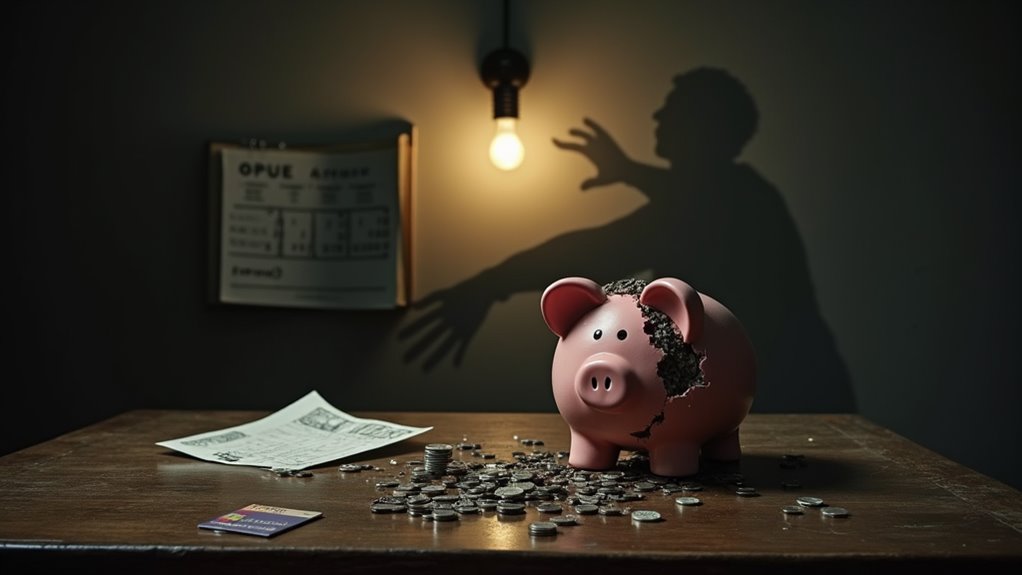
To avoid financial horrors, steer clear of the debt trap by not letting small purchases spiral into overwhelming credit card debt. Don't ignore the importance of a budget, as it helps you track spending and maintain control over your finances. Finally, resist the urge to make impulsive investments based on trends or tips. These mistakes can lead to severe consequences, but there's more to discover about safeguarding your financial future.
Key Takeaways
- Avoid falling into the debt trap by resisting impulse purchases and managing credit card usage effectively.
- Establish a budget to prevent chaotic finances and ensure expenses do not exceed income.
- Don't make impulsive investment decisions based on trends; always conduct thorough research before investing.
- Recognize the psychological triggers, like FOMO, that lead to impulsive financial behaviors and educate yourself on investment principles.
- Diversify your portfolio to minimize risks and protect against market downturns, promoting a disciplined investment approach.
Falling Into the Debt Trap

What it Looks like: Falling into the debt trap often begins innocently, with seemingly harmless purchases or small loans that gradually accumulate. Picture a person who takes out a credit card for everyday expenses, only to find themselves swiping it for non-essential items like dining out or entertainment. Over time, the balance grows larger, and the minimum payments become increasingly difficult to manage. This scenario can escalate quickly, leading to a cycle of relying on high-interest loans or even payday advances, which only deepens the financial hole. Many individuals in this situation may feel trapped, as they struggle to make ends meet and watch their debt spiral out of control.
Why It's Smart: Recognizing the signs of the debt trap and taking proactive measures is vital for financial health. By understanding how quickly debt can accumulate, individuals can make informed decisions about their spending habits and financial commitments. Creating a budget and sticking to it can help prioritize necessary expenses while minimizing unnecessary purchases. Additionally, seeking financial advice or counseling can provide valuable insights into effective debt management strategies. By being proactive, individuals can avoid the stress and anxiety that come from overwhelming debt, paving the way for a more secure financial future.
Things to Be Aware of: It's important to be mindful of the hidden costs associated with debt, such as high-interest rates and fees that can quickly add up. Individuals should also be cautious about relying on credit cards or loans without a clear repayment plan, as this can lead to a false sense of financial security. Moreover, it's significant to recognize the psychological toll that debt can take, which may result in feelings of shame or hopelessness. Building a strong financial foundation requires discipline, awareness, and a commitment to living within one's means to avoid falling into the debt trap.
Ignoring the Importance of a Budget

What it Looks like:
Ignoring the importance of a budget often manifests in a chaotic financial landscape where expenses routinely exceed income. Without a clear tracking system, individuals may find themselves overspending on discretionary items like dining out, entertainment, and impulse purchases, leading to a cycle of debt. Bills may pile up, and the overwhelming sense of financial disarray can result in anxiety and stress. People may also begin to rely on credit cards to cover daily expenses, creating a false sense of financial security while simultaneously accumulating high-interest debt. Fundamentally, the absence of a budget can lead to a precarious situation that feels out of control.
Why It's Smart:
Establishing and adhering to a budget is a fundamental step in achieving financial stability and peace of mind. A budget provides a clear picture of one's income and expenses, allowing for informed financial decisions that prioritize essential needs while also accommodating savings and investment goals. By regularly tracking spending, individuals can identify patterns, cut unnecessary costs, and allocate funds toward debt repayment or future savings. This proactive approach not only fosters healthier financial habits but also promotes a sense of empowerment, as individuals become more aware of their financial situation and can plan for both short-term and long-term goals.
Things to Be Aware of:
While budgeting is incredibly beneficial, it is important to recognize potential pitfalls. Rigid budgeting can lead to frustration if unexpected expenses arise or if it doesn't allow for flexibility in lifestyle choices. Additionally, individuals may fall into the trap of creating an unrealistic budget that they cannot stick to, which can result in abandonment of the process altogether. It's important to approach budgeting as a dynamic tool that can evolve with changing circumstances and priorities. Furthermore, regular reviews and adjustments are key to ensuring that the budget remains relevant, effective, and manageable over time.
Making Impulsive Investment Decisions

What it Looks like: Impulsive investment decisions often manifest as hasty purchases of stocks, cryptocurrencies, or other financial instruments without thorough research or consideration. Investors might jump on trending investments based on social media buzz or hot tips from friends, leading to a chaotic portfolio filled with high-risk assets. The excitement of potential quick profits can overshadow the reality of market volatility, resulting in a rollercoaster ride of emotions and financial instability. This impulsivity can also lead to missed opportunities for more calculated and potentially profitable investments as attention shifts rapidly from one shiny object to another.
Why It's Smart: Taking the time to evaluate investment opportunities can greatly enhance one's financial health. A well-thought-out investment strategy allows for a clear understanding of risk tolerance and long-term financial goals. By performing due diligence, such as analyzing market trends, financial statements, and expert opinions, investors are more likely to make informed choices that align with their overall strategy. This approach not only reduces the likelihood of losses but also fosters a sense of confidence that can lead to more rewarding investment experiences. Ultimately, patience and a disciplined mindset pave the way for sustainable growth and wealth accumulation.
Things to Be Aware of: Impulsive investing can lead to devastating financial consequences, including severe losses and increased anxiety about one's financial situation. It's crucial to recognize the psychological triggers that fuel impulsive behavior, such as fear of missing out (FOMO) or the thrill of potential quick gains. Additionally, the lack of a diversified portfolio can exacerbate risks, leaving investors vulnerable to market downturns. Educating oneself on investment principles, setting clear financial goals, and establishing a plan for when to buy or sell can help mitigate these risks. By cultivating a disciplined approach, investors can avoid the traps of impulsive decision-making and steer their finances towards a more stable future.
RELATED POSTS
View all


